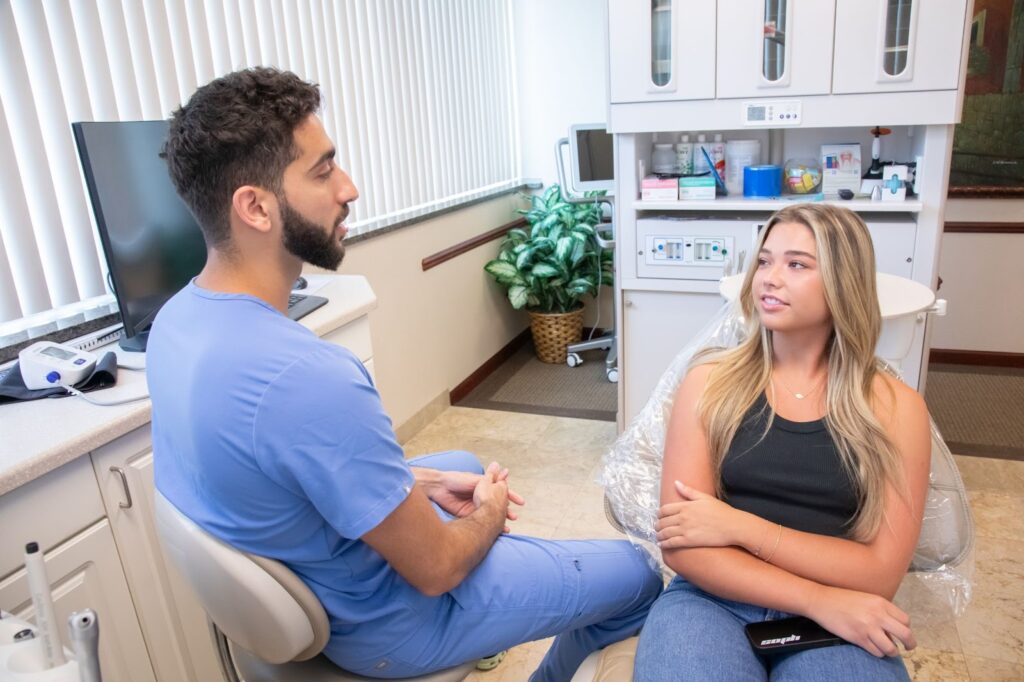Imagine enjoying a scoop of your favorite ice cream or sipping a hot cup of coffee, only to experience a sharp, sudden pain in your teeth. If this scenario is familiar, you’re likely among the many people in Shelby Township or Rochester Hills with tooth sensitivity. However, this discomfort doesn’t have to be a permanent part of your life. If that’s you, consult with Dr. Meri or Dr. Salem. In this blog post, our Barclay Dental team explores tooth sensitivity, its causes, prevention strategies, and effective treatments, all aimed at helping you reclaim the joy of your favorite foods and drinks.
Understanding Tooth Sensitivity
Tooth sensitivity is a common dental issue causing discomfort or sharp pain when your teeth are exposed to certain stimuli, like hot or cold temperatures, sweet or acidic foods, drinks, or even cold air. This discomfort can be temporary or chronic, affecting one tooth or several.
The root cause of tooth sensitivity is typically the exposure of dentin, the layer beneath your tooth enamel. Dentin contains microscopic tubules filled with tiny nerve endings. Enamel, the outermost rigid layer of your teeth, protects dentin, but dentin can become exposed when the enamel is worn down, or the gums have receded. This exposure allows heat, cold, acidic, or sticky substances to reach the nerve endings inside your teeth, leading to sensitivity or pain.
Common causes of enamel wear and gum recession include:
- Brushing your teeth too hard.
- Using a hard-bristled toothbrush.
- Grinding your teeth.
- Frequently consuming acidic foods and beverages.
- Gum disease.
- Even dental procedures like teeth whitening.
- Understanding the root cause of your tooth sensitivity is the first step toward locating a successful treatment.
Prevention of Tooth Sensitivity
Preventing tooth sensitivity involves good oral health care to protect your tooth enamel and gums. Here are some strategies that can help:
Our team recommends using soft-bristled toothbrushes and fluoride toothpaste. Floss daily to remove plaque. Make a point to floss between your teeth. Don’t forget about the gum line! Plaque really likes to hide in there.
These kinds of toothpaste can help block the transmission of pain signals from the tooth surface to the nerve and are often effective at reducing tooth sensitivity.
Acidic foods and drinks like citrus fruits, tomatoes, pickles, tea, and soda can cause enamel erosion. Cut back on your consumption of these foods and beverages. Remember to rinse your mouth with water after consuming them.
Brushing with too much force or a hard-bristled toothbrush can cause enamel erosion and gum recession. Remember, it’s not about how hard you brush but that you brush effectively. Regular dental check-ups and cleanings at Barclay Dental can help detect and address any early signs of tooth sensitivity, enamel erosion, or gum disease. If you grind your teeth at night—a condition known as bruxism—ask Dr. Meri or Dr. Salem about a mouth guard. This device can protect your teeth from damage while you sleep.
Remember, prevention is always better than cure. Taking steps like these can reduce your risk of developing tooth sensitivity and ensure a healthier, happier smile.

Treatment Options for Tooth Sensitivity
If you’re already experiencing tooth sensitivity, don’t worry—several treatment options can help alleviate your discomfort. At Barclay Dental, Dr. Meri and Dr. Salem are well-equipped to provide personalized treatment plans based on your needs.
Applied in-office, fluoride treatments strengthen tooth enamel. Fluoride also prevents you from feeling so much pain. This treatment can help decrease sensitivity, mainly when used with desensitizing toothpaste.
In some cases, Dr. Meri or Dr. Salem may apply a desensitizing agent or bonding resin to the sensitive root surfaces. This treatment can provide relief from sensitivity. Fillings, crowns, inlays, or bonding may correct a flaw or decay, resulting in sensitivity.
Our team may recommend a root canal if tooth sensitivity is severe and persistent and other ineffective treatments. This procedure treats problems in the dental pulp and is considered the most successful technique for eliminating tooth sensitivity.
When To See Us
While occasional tooth sensitivity may not require immediate attention, persistent discomfort or pain is a signal that you should schedule an appointment with Barclay Dental. If you’re experiencing tooth sensitivity, it’s essential not to ignore it. The underlying issue, like a cavity or gum disease, could worsen if not treated.
Dr. Meri and Dr. Salem are experienced in diagnosing and treating tooth sensitivity. They will examine your teeth, determine the cause of your sensitivity, and develop a personalized treatment plan to address it. They may also advise preventing further tooth sensitivity by recommending a softer toothbrush, a different brushing technique, or a special toothpaste.
Remember, our top priorities at Barclay Dental are your comfort and oral health. Suppose tooth sensitivity affects your quality of life, causing you to avoid certain foods or drinks because of the pain. In that case, it’s time to seek professional help. With the proper treatment, you can alleviate your discomfort and return to enjoying your favorite foods and beverages without fear of pain.

Treating Tooth Sensitivity At Barclay Dental
Tooth sensitivity can be a real pain, but with the proper knowledge and care, it doesn’t have to be a lifelong burden. By understanding its causes, taking preventive measures, and seeking appropriate treatments, you can alleviate this discomfort and enjoy your favorite hot or cold treats without fear. Remember, at Barclay Dental, your oral health and comfort are our top priorities. If you’re experiencing tooth sensitivity, and live near Shelby Township or Rochester Hills, schedule a free consultation. Work with Dr. Meri and Dr. Salem to keep your smile delightful, pain-free, and long-lasting.
